Topic updates
Guest Blog: Game Management - the Geography of the Qatar World Cup 2022
18th August 2022
The Geography of Sport is not new. Back in 1992 I wrote the resources for the World Cup in Japan for the Japan Festival Trust, used in schools all over the UK. Here I offer information on the 2022 World Cup in Qatar, ahead of the event so that it an be built into SoW this Autumn term. The date of the event is a major geographical compromise, but more on that later!
The info is curated from The Athletic, The BBC and Reutures and Khaleej imes.
The media creates student awareness of the event and good resources focus on the geographical issues and concepts of the host country, not so much the football.
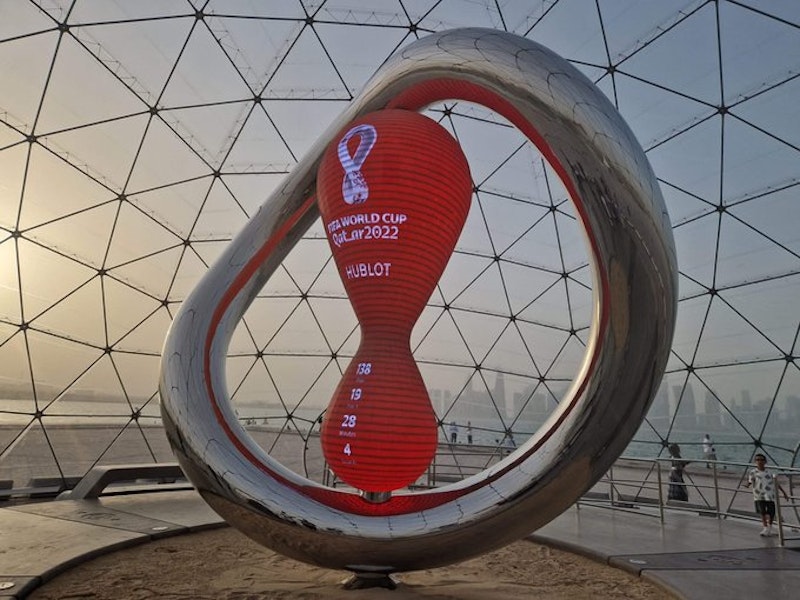
When is the 2022 World Cup and how hot will it be?
The World Cup finals are being held between 21 November and 18 December - when the temperature in Qatar usually reaches 25C (77F).
Had the finals been held in June and July, as they normally are, the matches would have been played in temperatures exceeding 40C and possibly reaching 50C.
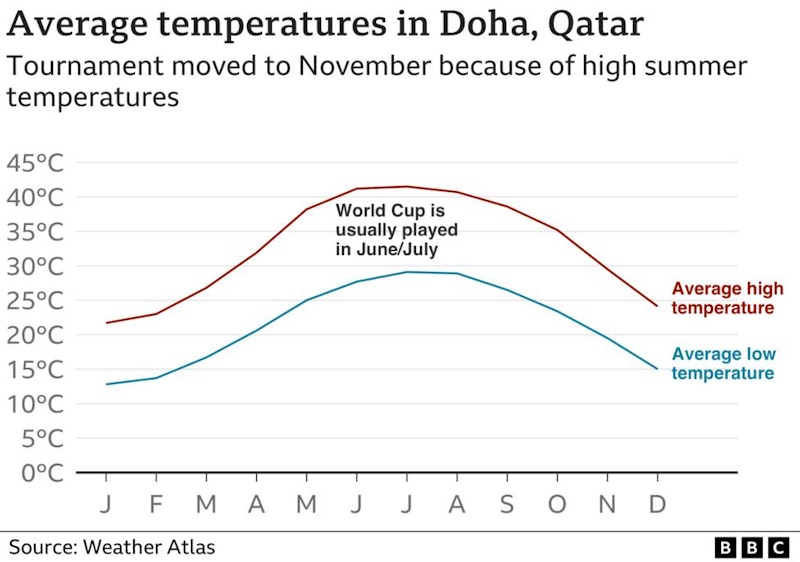
Qatar, a tiny Gulf state known for its scorching desert climate, initially proposed that it would host the finals during the summer in air-conditioned enclosed stadiums, and had designed an energy-efficient cooling system that can make its open-air stadiums usable even in summer temperatures that soar well into the 40s. but the plan was rejected.
The plan was rejected and football’s next global showpiece tournament was moved to November and December to avoid Doha’s intense summer heat, but Qatar decided to stick with the chilled stadiums in order to have future venues that would be usable year-round.
Al Janoub, a 40,000-seat venue made to resemble the sail of a dhow, or traditional wooden sailboat, was opened last May and is the first to showcase the new cooling system. “You’re living inside a micro, climate-controlled bubble,” said Saud Abdul-Ghani, a Qatar University mechanical engineering professor who led the design, as he waved a bright orange thermometer to demonstrate the roughly 14-degree drop.
Along the pitch dozens of soccer ball-sized nozzles blow out chilled air, while tiny angular ducts beneath the seats keep the stands at 24-26 degrees. Sensors around the stadium keep track of different zones and adjust the flow from a control room. When asked the price tag of the cooling system, Abdul-Ghani said: “a good amount of money”, without providing a figure. Thani Khalifa Al Zarraa, the project manager for Al Janoub Stadium, said the cooling system increased the cost of construction by two to three times, to around $6,000-7,000 per seat, suggesting a stadium cost of about $240-280 million.
Doha has put the tournament at the centre of a national development plan aimed at diversifying its energy economy and projecting itself on to the world stage through sport. Qatar World Cup organizing committee officials have said the country is spending $6.5-7 billion on all stadiums and training facilities combined.
Climate solution
Despite the chilled stadiums, Qatar has said its World Cup will have the smallest carbon footprint of any before it. Nasser Al Khater, CEO for FIFA World Cup Qatar 2022, said Doha’s compact tournament will eliminate the need for domestic flights and a new metro system will further cut emissions.
Abdul-Ghani said the system, which has been left unpatented for others to adopt, requires about a fifth of the energy typical to cool spaces of the same size, such as airport terminals or closed baseball fields, because it continuously recycles air into small zones.
“The Americans, Mexicans and Canadians will surely look at this because of thermal stress on players,” Abdul-Ghani said, referring to the host nations of the 2026 World Cup. The 2026 tournament will be expanded to 48 teams as opposed to 32 and matches will be played across the United States, Canada and Mexico. Candidate cities include Miami, Atlanta, Orlando, Dallas, Houston and others which are notoriously hot and humid in the summer.
“With global warming, Paris was 40 plus, the U.K. 35 plus, so even the Europeans need to look at this carefully,” Abdul-Ghani added, referring to this summer’s heat-wave.
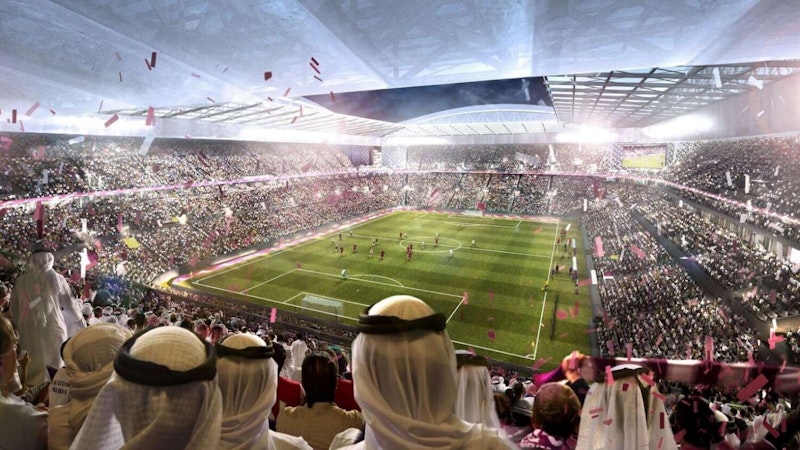
Why was Qatar chosen as the World Cup host?
In 2010, Qatar clinched the rights to the World Cup after winning a ballot of Fifa's 22 executive members. It defeated bids from USA, South Korea, Japan and Australia. It is the first Arab nation to host the tournament.
Qatar was accused of paying Fifa officials £3m ($3.7m) in bribes to secure their backing, but was cleared after a two-year investigation. At the time, Fifa's then-chairman, Sepp Blatter, supported Qatar's bid, but has since said the organisation may have made the wrong decision.
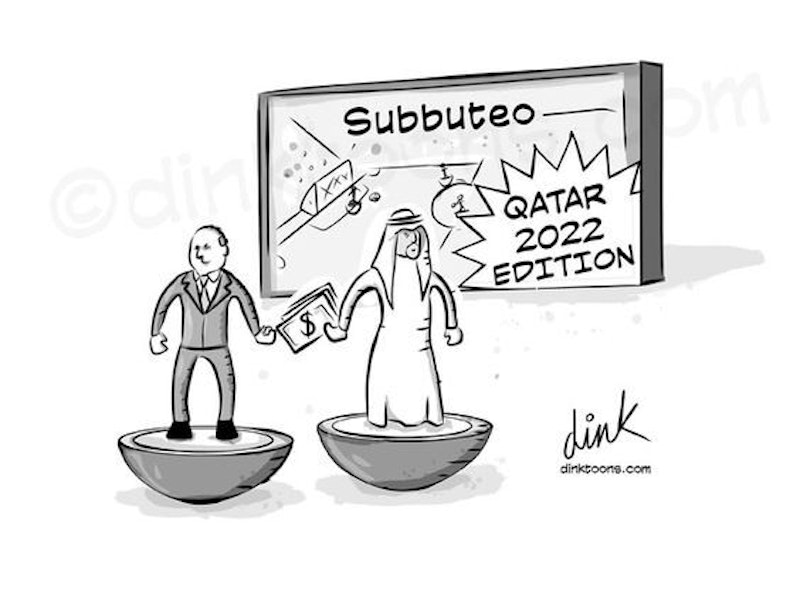
What can World Cup fans expect in Qatar?
Qatar, which has a population of 2.9 million, is one of the world's wealthiest countries thanks to oil and gas exports. It has built seven stadiums specifically for the tournament, and an entire new city which will stage the final match. More than 100 new hotels, a new metro and new roads are also being constructed.
The tournament's organising committee estimates that 1.5 million people will attend the finals.
Qatar is a conservative Muslim country, and fans have been warned to be careful about their behaviour. There are severe restrictions on drinking alcohol. It can normally be bought only in bars in luxury hotels. A pint of beer can cost £10 ($13). However, the organisers say alcohol may be sold in designated fan zones during the tournament.
What is Qatar's record on gay rights?
Homosexual acts are illegal in Qatar. Groups representing gay football fans have asked the Qatar government to "guarantee their safety". Some Wales fans have said they will boycott the tournament despite their team's qualification. The World Cup's organisers have replied that "everyone is welcome", but confirmed that Qatar will not relax its laws on homosexuality during the event.
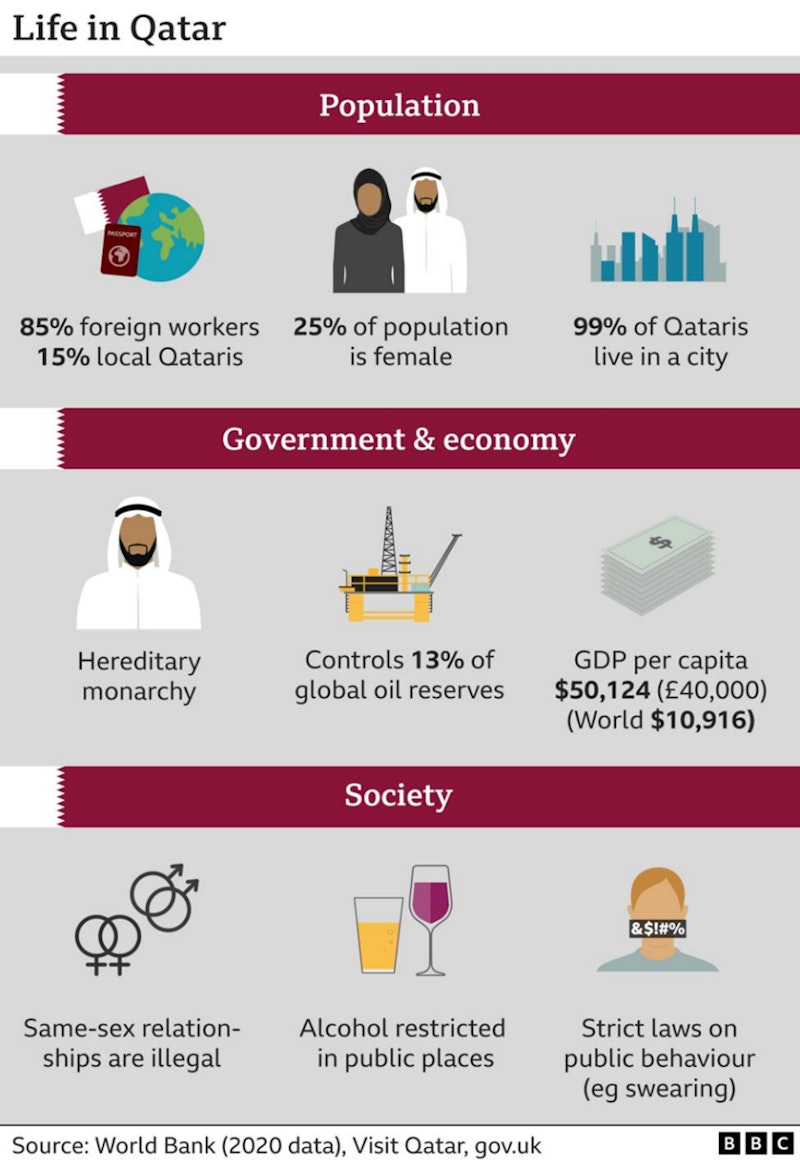
Accommodation
UAE hotels and homestays are witnessing a major upswing before the final kick-off of the biggest sporting event in the region. Experts see at least a 20% increase in room rates, and many expect 100% occupancy during the Qatar World Cup. Industry experts expect the football spectacle to boost the hospitality industry in the country.
The 2022 Fifa world cup which is scheduled to take place in Qatar from November 21 to December 18 is expected to attract millions of spectators from all across the world. The country, with its limited accommodation, had previously announced shuttle services from neighbouring countries to meet the influx of visitors.
Leading airlines in the UAE, including Air Arabia and flydubai have announced shuttle services to Qatar, taking the flights between the two countries up to more than 60 a day. Only those with valid tickets to the matches will be able to take these flights. Flyers will also need a Hayya Card to access the stadium and avail of the free transportation to and from stadiums on the Doha metro.
Many football fans will prefer to stay in Dubai and travel to Qatar to watch the games since it is just 30 minutes away by plane. That way they can visit Dubai while attending the World Cup in Qatar. Due to that, holiday home prices have gone up making it high season with an occupancy rate expected to reach 100%.
“The demand for rooms during the World Cup is causing a surge in prices, with a 20 percent increase in room rates, especially during the group stages,” said Varun Ahuja, Director of Sales at Aloft Dubai South. “Being a hotel close to the airport, we have a robust pipeline of individual and group bookings from (match) ticket holders, and we expect demand for accommodation to spike again in August and September”
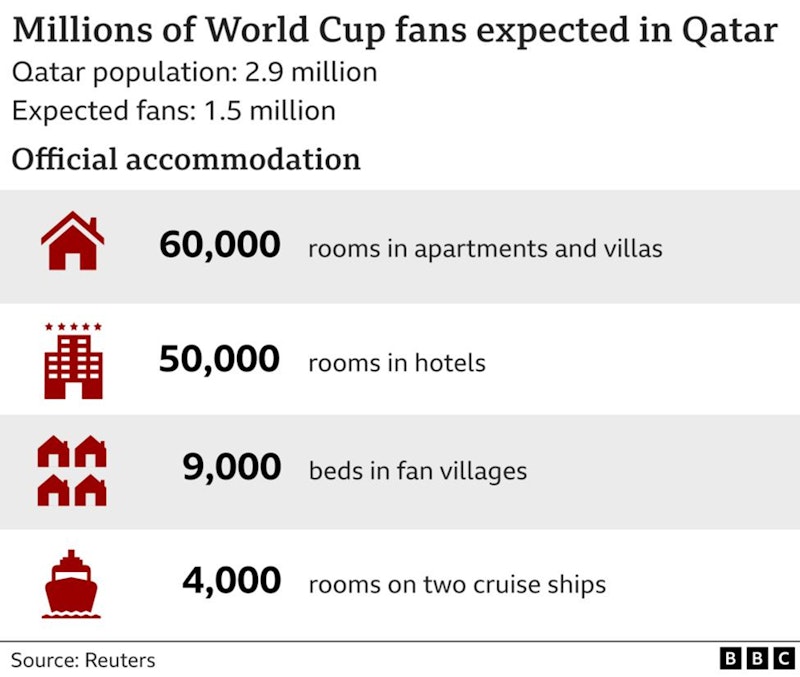
A controversial tournament!
At times it's been a tough task to keep up with all the reasons football fans are so opposed to the tournament. In case you needed a refresher, here are the six biggest problems with the 2022 World Cup in Qatar:
1 - The date
Despite this week's media furore, a winter tournament is arguably one of least objectionable aspects of the Qatar World Cup.
England fans may be disappointed to miss out on the tops-off, lager in hand, summer sing-along atmosphere that usually accompanies the tournament, but a November – December event is only really an issue due to its conflict with the European domestic football calendar.
Many other leagues around the world have to adjust their schedules or sacrifice players for a summer World Cup, and would argue it’s only fair for Europe’s to take their turn.
Yet it’s worth remembering that the vast majority of players who make the tournament so special for fans – and so lucrative for Fifa – come from Europe’s top leagues. Around 74 per cent of all the players present at last year’s tournament in Brazil came from Europe.
Considering European leagues will provide the stars whose fame Fifa will undoubtedly exploit to maximise marketing revenue (around £800m at the Brazil World Cup), it’s understandable why they are feeling pretty peeved.
2 - The bid
Qatar won the right to host a tournament specifically designated for the summer. Bids were developed and votes were cast for an event that was supposed to take place in June – July.
Qatar’s bid for the tournament made no mention of hosting it winter. No, this is how it genuinely proposed it would combat the searing temperatures: Each of the five stadia will harness the power of the sun's rays to provide a cool environment for players and fans by converting solar energy into electricity that will then be used to cool both fans and players at the stadia. When games are not taking place, the solar installations at the stadia will export energy onto the power grid. During matches, the stadia will draw energy from the grid. This is the basis for the stadia's carbon-neutrality.
'Insisting that WC should be moved to winter = admitting that the candidate (for a summer WC) should never have been even considered' - Sid Lowe (@sidlowe) February 24, 2015
The United States, which finished runners-up to Qatar in the voting, has a right to be annoyed that it lost to a bid which Fifa has now decided is not suited to the dates it proposed.
3 - The corruption allegations
Fifa's ethics committee, which cleared Qatar to host the tournament after an investigation into allegations of World Cup, kickbacks found that while there may have been the odd dodgy dealing, any breaches of the rules were of "very limited scope".
For many it's a problem that an investigation was necessary in the first place, but doubts have been cast on Fifa's published summary of the investigation's findings after its author, Michael Garcia, described the resulting report as "materially incomplete" with "erroneous representations".
The Sunday Times has published a number of stories with claims it has obtained documents detailing payments made by former Asian Football Federation chief Mohammed bin Hammam to member confederations in exchange for votes. All those accused have denied the allegations.
Qatar's proposed stadiums look beautiful, but criticism has mounted over conditions endured by those who build it. (Source: Getty)
4 - The treatment of workers
Qatar has promised 12 shiny new stadiums in time for the tournament, yet the human cost of its ambitious construction plans is depressingly high.
The International Trade Union Confederation estimates that as many as 4,000 expatriate construction workers will die before the World Cup gets underway in 2022.
Criticism for Qatar's kafala labour system – which requires immigrant workers to have an in-country sponsor responsible for their legal status – has led to the country promising new legislation based on employment contracts, although the extent of the reforms to what has been described as "modern day slavery" remains unclear.
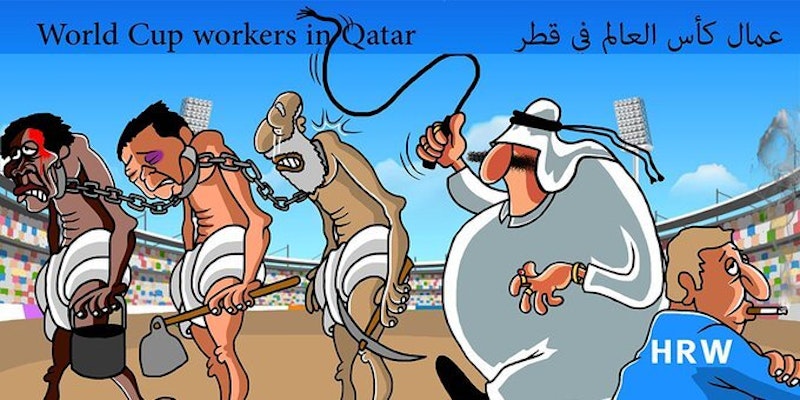
5 - The attitude towards LGBT rights
Same-sex sexual activity is completely outlawed in Qatar, with a punishment of up to seven years in prison, or possibly even death for Muslims. In 2013 it was reported that Qatar and other Gulf Cooperation Countries (Bahrain, Kuwait, Oman, Saudi Arabia and the United Arab Emirates) were even developing a “medical” test to detect and bar foreign homosexuals from entering the country.
But don’t worry. Qatar’s sports minister Salah bin Ghanem bin Nasser al-Ali has said the host country will come up with “creative” solutions to the issue of LGBT fans or players travelling to the tournament. Al-Ali told the Associated Press last year that Qatar doesn’t want to create “this impression, illusion that we don't care about our tradition and our ethical values … We are studying all these issues. We can adapt, we can be creative to have people coming and enjoying the games without losing the essence of our culture and respecting the preference of the people coming here. I think there is a lot we can do".
6 - The football culture
Relatively minor compared to some of the above issues, but Qatar’s complete lack of footballing pedigree or culture is far from ideal for the host of the biggest football competition on earth. The men’s national team is ranked 109th in the world by Fifa, below heavyweights such as Faroe Islands, Belarus and Iraq. Never before has it appeared at a World Cup final and only twice has the team progressed from the group stage at the Asian Cup.
With the a native population of less than 300,000, some believe Qatar will look to naturalise professionals from abroad in order to increase its chances. Paris Saint-Germain are one of the many European clubs who have been invited to train at the Aspire Academy. (Source: Getty) That was certainly the case when it hosted the World Men’s Handball Championship earlier this year, where its team finished second. Qatar had never finished higher than 16th previously, but with a team composed of former internationals from Serbia, Spain, France and elsewhere, this tournament ended in less ignominious fashion for the hosts (depending on your perspective).
Sceptics argue Qatar’s well-funded Aspire Academy, which screens nearly 500,000 young players a year (mainly based in Africa) and brings the best prospects to train with European coaches in Doha, could be used for a similar purpose – although Qatar has denied the suggestion. The country's squad for the recent Asian Cup in Australia featured seven players born elsewhere.
It’s not just players Qatar is lacking either: migrant workers have even been paid to watch sports events in order to fill up empty stadiums.
You might also like
Resource Development Stage
Study Notes

Atlas of the Sustainable Development Goals
10th August 2017
‘Clear the Deck’ Interactive Revision Quiz for Paper 2: Development
Quizzes & Activities